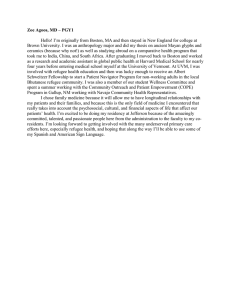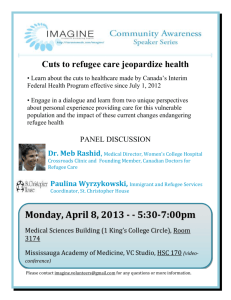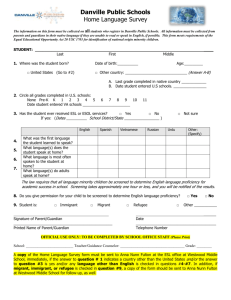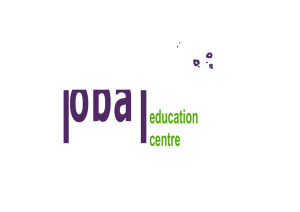Describe career-related issues for and provide career information to
advertisement
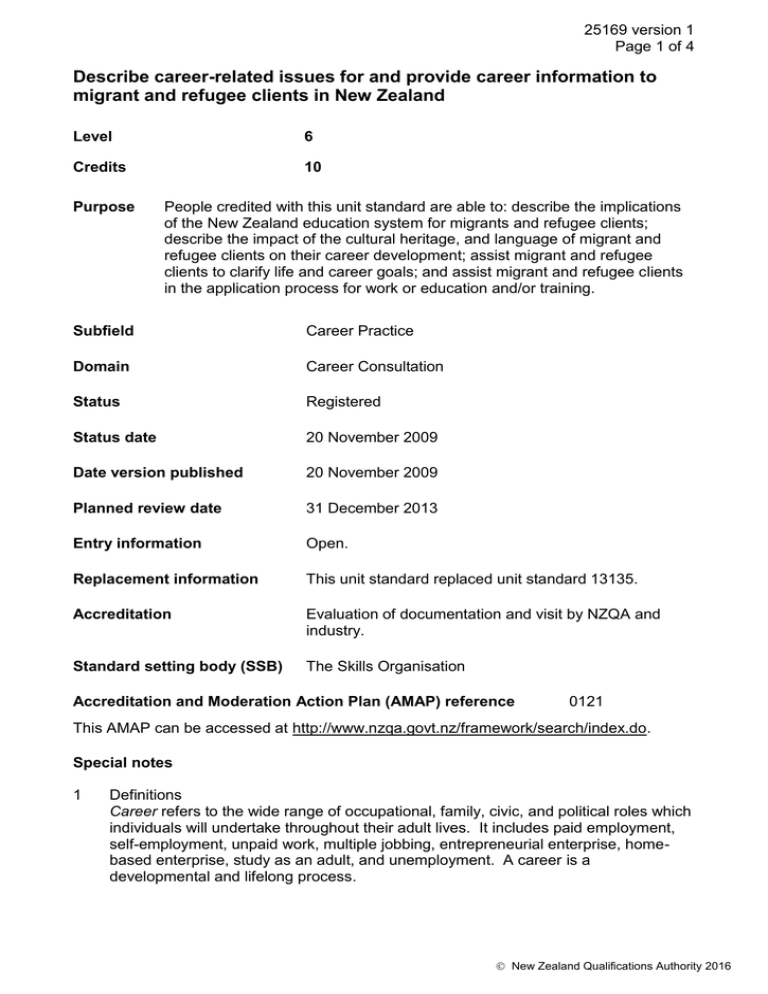
25169 version 1 Page 1 of 4 Describe career-related issues for and provide career information to migrant and refugee clients in New Zealand Level 6 Credits 10 Purpose People credited with this unit standard are able to: describe the implications of the New Zealand education system for migrants and refugee clients; describe the impact of the cultural heritage, and language of migrant and refugee clients on their career development; assist migrant and refugee clients to clarify life and career goals; and assist migrant and refugee clients in the application process for work or education and/or training. Subfield Career Practice Domain Career Consultation Status Registered Status date 20 November 2009 Date version published 20 November 2009 Planned review date 31 December 2013 Entry information Open. Replacement information This unit standard replaced unit standard 13135. Accreditation Evaluation of documentation and visit by NZQA and industry. Standard setting body (SSB) The Skills Organisation Accreditation and Moderation Action Plan (AMAP) reference 0121 This AMAP can be accessed at http://www.nzqa.govt.nz/framework/search/index.do. Special notes 1 Definitions Career refers to the wide range of occupational, family, civic, and political roles which individuals will undertake throughout their adult lives. It includes paid employment, self-employment, unpaid work, multiple jobbing, entrepreneurial enterprise, homebased enterprise, study as an adult, and unemployment. A career is a developmental and lifelong process. New Zealand Qualifications Authority 2016 25169 version 1 Page 2 of 4 Career practice refers to the umbrella profession under which the following vocations sit – career resources, career information, career education, and career consultation which includes career counselling, career advice, and career guidance. Client refers to people receiving a career related service who may be individuals or groups, associated with employment, education, or training, or in some cases may be an organisation. Education may include training. Needs, in the context of this unit standard, are those relating to gender, culture, ethnicity, age, religion, philosophy, learning, disability, socio-economic group, career options, and language. Work options refer to contractual, portfolio, self-employment, salaried, wages, fulltime, part-time, and voluntary. 2 Legislation relevant to this unit standard includes but is not limited to the: Privacy Act 1993, Human Rights Act 1993. Elements and performance criteria Element 1 Describe the implications of the New Zealand education system for migrant and refugee clients. Performance criteria 1.1 Differences in New Zealand education systems are recognised and interpreted in relation to the migrants’ and refugee’s cultures of origin. 1.2 The New Zealand system of qualification equivalence is analysed in terms of its implications for migrants and refugees to New Zealand. 1.3 The New Zealand system of recognition of prior learning is outlined in terms of its implications for migrants and refugees to New Zealand. Element 2 Describe the impact of the cultural heritage of migrant and refugee clients on their career development. Performance criteria 2.1 The impact of the cultural background of clients is outlined in terms of their career development in New Zealand. 2.2 The influence of the family and community of clients is outlined in terms of the career development of migrants and refugees to New Zealand. 2.3 The impact of the cultural background of migrants and refugees is outlined in terms of access to education. New Zealand Qualifications Authority 2016 25169 version 1 Page 3 of 4 2.4 The impact of the cultural background of migrants and refugees is outlined in terms of the labour market trends. Element 3 Describe the impact of the language of migrant and refugee clients on their career development. Performance criteria 3.1 The impact of language on migrants and refugees is recognised in terms of career development. 3.2 Language acquisition options are identified and evaluated in terms of availability, access, funding, and relevance to migrant and refugee clients. 3.3 Sources of language support or interpreting services are identified and outlined to migrant and refugee clients in relation to their individual needs. Element 4 Assist migrant and refugee clients to clarify life and career goals. Performance criteria 4.1 Differences in the structure and status of education and work in New Zealand are explained to migrant and refugee clients in relation to their place of origin. 4.2 The career practitioner provides information to the clients about current research, work patterns, and labour market trends in accordance with the needs of the migrant and refugee clients. 4.3 Work options are identified with migrant and refugee clients in terms of their strengths, skills, needs, expectations, and preferences. 4.4 Selected work options are explored and prioritised in terms of the client’s needs and expectations, and the needs and expectations of family and community. 4.5 Education and vocational goals are formulated with migrant and refugee clients that are achievable and realistic for client in terms of time, funding, access, location, and academic ability. 4.6 Alternative strategies to achieve vocational and educational goals are explored in accordance with the needs of migrant and refugee clients. 4.7 Referral of migrant and refugee clients is in accordance with identified needs and goals. Range referral includes but is not limited to – employment, education, government agencies, and other services. New Zealand Qualifications Authority 2016 25169 version 1 Page 4 of 4 4.8 The family of migrant and refugee clients are integrated into the career practice process, where appropriate, and education and work options are evaluated in accordance with the client’s identified needs and goals. Element 5 Assist migrant and refugee clients in the application process for work or education and/or training. Performance criteria 5.1 The processes of application for work or education and/or training are explained to migrant and refugee clients in accordance with their needs. 5.2 Assistance with the application process for work or education and/or training is provided in accordance with migrant and refugee clients’ needs. Please note Providers must be accredited by NZQA, or an inter-institutional body with delegated authority for quality assurance, before they can report credits from assessment against unit standards or deliver courses of study leading to that assessment. Industry Training Organisations must be accredited by NZQA before they can register credits from assessment against unit standards. Accredited providers and Industry Training Organisations assessing against unit standards must engage with the moderation system that applies to those standards. Accreditation requirements and an outline of the moderation system that applies to this standard are outlined in the Accreditation and Moderation Action Plan (AMAP). The AMAP also includes useful information about special requirements for organisations wishing to develop education and training programmes, such as minimum qualifications for tutors and assessors, and special resource requirements. Comments on this unit standard Please contact The Skills Organisation info@skills.org.nz if you wish to suggest changes to the content of this unit standard. New Zealand Qualifications Authority 2016
